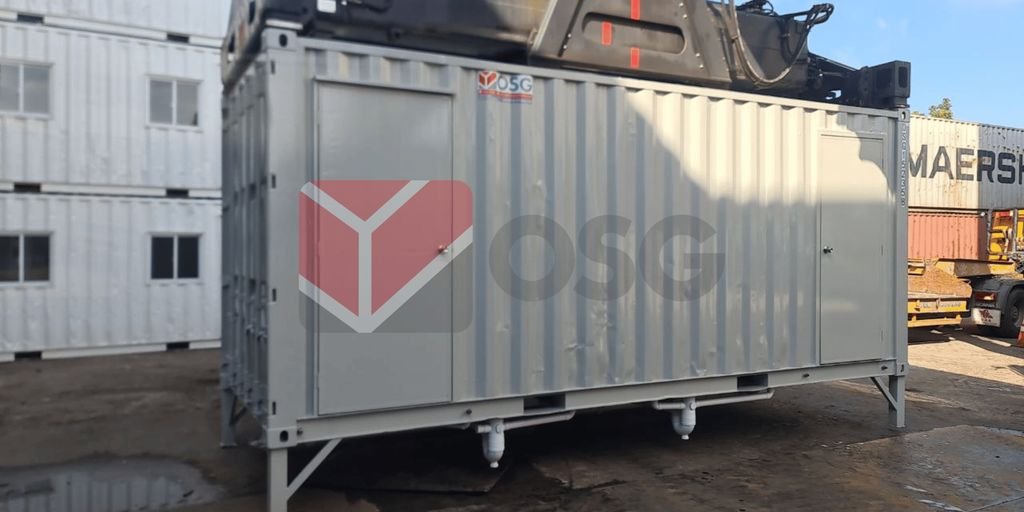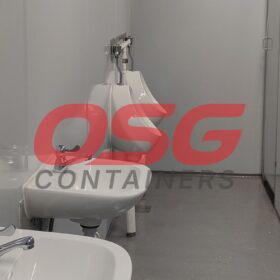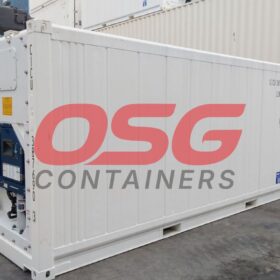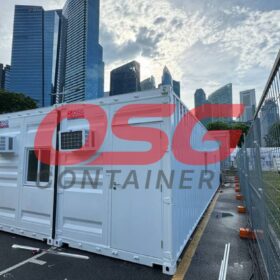So, you need a shipping container, huh? It’s a common question many businesses face: should you rent a container or just buy one outright? It really depends on what you’re using it for and how long you’ll need it. Think about it like borrowing a tool versus buying your own – each has its own set of pros and cons. We’re going to break down the differences to help you figure out the best path for your specific situation.
Key Takeaways
- Renting a container is often best for short-term projects, giving you flexibility and a lower initial cost.
- Buying a container makes sense for long-term needs, offering full customization and potential resale value.
- Consider how long you’ll use the container; renting can be more cost-effective for periods under two years.
- Factor in modification needs; buying gives you complete freedom to alter the container, while rentals usually have restrictions.
- Evaluate total costs, including potential hidden fees for rentals and maintenance or storage costs for owned containers, to make the best financial decision.
Understanding Your Container Needs
Before you even think about whether to rent or buy a container, you really need to sit down and figure out what you’re going to use it for. It sounds obvious, but people often jump into decisions without really looking at the details. This can lead to paying for something you don’t need or, worse, not having enough space or the right kind of container when you really need it.
Assessing Project Duration
How long do you actually need this container? Is this for a quick, few-month project, or are you looking at something that might last a year or even longer? If it’s a short gig, renting usually makes more sense. You get the space you need without the long-term commitment. But if you know you’ll need it for years, buying might start to look like a better deal over time. It’s like renting a car for a weekend versus buying one if you plan on driving everywhere for the next decade.
Determining Usage Frequency
Think about how often you’ll be accessing the container. Will it just sit there, holding stuff, or will you be in and out of it daily? If you’re constantly loading and unloading, you’ll want something that’s easy to get into and out of. Also, consider if you’ll need to move it around a lot. Some containers are easier to relocate than others, and this can be a big factor depending on your workflow.
Evaluating Modification Requirements
Do you plan on changing the container at all? Maybe you need to add shelves, insulation, or even windows. If you’re thinking about making modifications, buying gives you a lot more freedom. You can cut it, weld it, paint it – whatever you need. Renting usually comes with rules about what you can and can’t do to the container. You can’t just go drilling holes in something that isn’t yours, right?
Figuring out your needs upfront saves a lot of headaches later. It’s better to spend a little extra time planning than to end up with the wrong container and have to deal with the hassle of swapping it out or making do.
Here’s a quick way to think about it:
- Short-term need (under 1 year): Renting is often the way to go.
- Long-term need (over 1 year): Buying might be more cost-effective.
- Frequent access/movement: Consider ease of access and portability.
- Modifications needed: Buying offers more flexibility.
The Advantages of Renting a Container
Renting a shipping container can be a really smart move, especially if you’re not sure about your long-term needs or if you’re working with a tight budget. It’s all about flexibility and keeping your upfront costs low. Think of it like leasing a car versus buying one – you get to use it without the big commitment.
Flexibility for Short-Term Projects
If your project is temporary, like a seasonal storage need or a construction job that’s expected to wrap up in a few months, renting is often the way to go. You get the space you need without being tied down. When the job is done, you just return the container. This avoids the hassle of figuring out what to do with a container you own but no longer need. It’s also great if you’re testing out a new business idea that might require extra storage space for a limited time. You can easily scale up or down as your project evolves, which is something you can’t do as easily when you own.
Lower Upfront Investment
Let’s face it, buying a shipping container outright can be a significant expense. Renting, on the other hand, requires a much smaller initial outlay. You typically pay a monthly fee, which makes budgeting much simpler, especially for smaller businesses or startups. This means you can allocate your capital to other areas of your business that might need it more, like inventory or marketing. It’s a practical way to get the benefits of a container without a large capital expenditure. For example, if you’re looking for container singapore options, renting can be a more accessible entry point.
Access to Newer Models
Rental companies often have fleets of newer or well-maintained containers. This means you might get access to containers that are in better condition, potentially with fewer cosmetic issues or even some basic modifications already done. When you rent, you’re less likely to inherit problems from a container’s previous life. Plus, if your needs change and you require a different size or type of container, it’s usually easier to swap it out with your rental provider than it would be if you owned.
Renting offers a practical solution for businesses that need adaptable storage or workspace without the long-term financial commitment of ownership. It allows for easier budget management and provides access to a variety of container options, making it a flexible choice for many scenarios.
Here’s a quick look at why renting might be the better choice:
- Cost-Effective for Short Durations: If your need is less than six months to a year, renting usually costs less overall than buying.
- Reduced Maintenance Hassle: Most rental agreements include maintenance and repairs, saving you time and money.
- Avoids Disposal Issues: When you’re done, you simply return the container, eliminating the problem of selling or storing it yourself.
- Flexibility to Change: Easily switch container sizes or types if your project requirements change.
When Buying a Container Makes Sense
So, you’re thinking about taking the plunge and actually buying a shipping container instead of just renting one. That’s a big step, and honestly, it can be a really smart move if your situation lines up with it. Owning a container means you’re not tied to rental agreements, and you have a lot more freedom to do what you want with it.
Long-Term Investment Strategy
If you know you’re going to need a container for a good chunk of time, like several years, buying can actually save you money in the long run. Think about it: those monthly rental fees add up, and if you’re using it consistently, buying it outright might be cheaper than paying rent for years on end. Plus, when you own it, it’s an asset. You can sell it later and get some of your money back, especially if you’ve kept it in good shape. It’s like buying a piece of equipment for your business that you can eventually recoup some costs from.
Complete Customization Freedom
This is a big one for a lot of people. When you own a container, say a 40 high q container, you can modify it however you see fit. Need to add insulation for a workshop? Want to paint it a specific color for a pop-up shop? Maybe you need to install shelving or windows. With ownership, you have the green light to make all those changes without asking permission or worrying about violating a rental agreement. It’s your container, so you can tailor it precisely to your project’s needs, whether that’s for extra storage, a mobile office, or something totally unique.
Potential for Resale Value
Buying a container isn’t just about using it; it’s also about its potential value down the road. Shipping containers, especially the standard ones like a 40 high q container, tend to hold their value pretty well. If you maintain it properly, you can expect to sell it for a decent price when you’re done with it. This makes it a more attractive option for businesses that see their container needs extending over many years, or for those who like to have an exit strategy for their assets. It’s not just an expense; it’s an investment that can potentially give you a return.
Owning a container gives you the ultimate control over its use, modification, and eventual disposal or resale. It’s a commitment, but one that can pay off significantly for long-term or highly customized needs.
Financial Considerations: Rent vs. Buy
When you’re figuring out whether to rent or buy a shipping container, the money side of things is a big deal. It’s not just about the sticker price; you’ve got to think about the long haul and any little costs that might pop up.
Comparing Monthly Rental Costs
Renting a container can seem pretty straightforward at first. You pay a monthly fee, and that’s that, right? Well, usually. For a standard 20-foot container, you might be looking at anywhere from $75 to $100 a month. If your project is short, say a year to 18 months, this can add up to roughly $900 to $1,800. It’s a predictable expense, which is nice for budgeting. But remember, rental agreements can have their own quirks. Sometimes there are extra charges for things like special locks, damage waivers, or if you happen to return it a day late. And if your project runs over, those monthly payments keep coming, potentially making it more expensive than buying outright over time.
Analyzing Purchase Price and Depreciation
Buying a container means a bigger hit to your wallet upfront. A used 20-foot container might cost you between $1,500 and $3,000, depending on its condition and where you are. Delivery costs can also add a few hundred dollars. The upside is that once you own it, you don’t have monthly payments. Think of it like buying a car; it loses some value over time (depreciation), but it’s yours. You can use it for as long as you need, and when you’re done, you can sell it. The resale value can often get you a good chunk of your initial investment back, especially if the container is still in decent shape.
Understanding Hidden Fees and Maintenance
Beyond the basic rental fee or purchase price, there are other costs to keep in mind. With rentals, watch out for those "hidden" fees we mentioned – things like cleaning charges if you leave it messy, or fees if you want to paint it. Maintenance is usually covered by the rental company, which is a plus. But if you buy, you’re the one responsible for any repairs. If a storm damages it, or you need to fix a leaky seal, that cost comes out of your pocket. However, these maintenance costs for a container are generally pretty low over the years, especially compared to the cumulative rental fees you might pay for a long-term need.
Owning a container means you’re responsible for its upkeep, but this responsibility often translates to greater freedom and potential long-term savings compared to the recurring costs and limitations of renting.
Here’s a quick look at potential costs:
| Cost Type | Renting (Estimate) | Buying (Estimate) |
|---|---|---|
| Upfront Cost | Low (Deposit) | High ($1,500-$3,000+) |
| Monthly Cost | $75 – $100 | $0 (after purchase) |
| Maintenance | Included | Your responsibility |
| Potential Hidden Fees | Locks, late fees | Repairs, storage |
| Resale Value | None | Potential recovery |
Logistical Aspects of Container Use
Planning for Container Movement
Moving a cargo container, whether it’s a 20 ft sea container or a larger model, involves some serious planning. If you’re renting, the company might handle the transport, which simplifies things a lot. They’ve got the trucks and the drivers, so you don’t have to worry about finding someone to haul it. But if you own the container, you’re on your own. You’ll need to figure out transportation, which can get pricey. Think about where it needs to go – across town, to a different state, or even overseas. Each move has its own set of rules and costs.
Storage and Disposal Responsibilities
Once you’ve got your container, where does it live? If you own it, you’re responsible for finding a place to keep it when it’s not in use. This can be a challenge, especially if you don’t have a lot of space on your property. Storage fees can add up, particularly in urban areas. And when you’re done with it for good, how do you get rid of it? Selling it is an option, but there’s no guarantee you’ll get your money back. Disposal can also be a hassle.
Managing Rental Agreements
When you rent a container, you’ll sign an agreement. It’s important to read this carefully. These agreements often have rules about what you can and can’t store inside. For example, you might not be allowed to keep hazardous materials, certain types of vehicles, or anything illegal. If your business needs require storing items that are restricted by rental agreements, buying might be a better fit. You’ll also want to understand the terms for returning the container and any potential fees for damage or late returns.
Owning a container gives you the freedom to use it as you see fit, but it also means you’re responsible for all the logistics, from moving to storage and eventual disposal. Renting often bundles some of these services, making it simpler but potentially more restrictive.
Making the Final Decision
So, you’ve looked at all the angles – how long you need it, how often you’ll use it, and if you even want to change it up. Now it’s time to really nail down what works best for your situation. It’s not just about the container itself, but how it fits into your bigger picture.
Aligning Options with Business Goals
Think about where your business is headed. If you’re in a growth phase and might need to scale up or down quickly, renting offers that breathing room. You can add more units if demand spikes or return them if things slow down, without being stuck with assets you don’t need. On the other hand, if your business model relies on stable, long-term operations, buying might be the way to go. Owning a container can be part of your company’s asset base, providing a predictable resource for storage or operations.
Considering Seasonal Demands
Many businesses have busy seasons and slower periods. For example, a retail business might need extra storage for holiday inventory, or a construction company might need temporary site offices during a specific project phase. Renting is often ideal here because you can get the container when you need it and send it back when the season or project is over. This avoids the cost of having a purchased container sit idle for months.
Seeking Expert Advice
Sometimes, even after weighing everything, you might still feel unsure. That’s totally normal. Don’t hesitate to reach out to container suppliers or even a business consultant. They can offer insights based on your specific industry and needs. They might know about deals on rentals or have advice on the best type of container to buy for your intended use. It’s always good to get a second opinion, especially when it involves a significant financial commitment.
Ultimately, the choice between renting and buying a container boils down to flexibility versus ownership. Renting gives you adaptability for short-term or changing needs, while buying offers long-term control and potential equity. Carefully consider your operational timeline, budget, and future plans before making your final call.
So, Rent or Buy? The Final Word
Ultimately, figuring out whether to rent or buy a shipping container really comes down to what your business needs right now and what you see happening down the road. If you’ve got a short-term project or need some extra space for just a little while, renting offers a lot of flexibility without a big upfront cost. But if you’re planning to use a container for years, or if you want to make it your own with modifications, buying might be the way to go. It’s a bigger investment at first, sure, but it can save you money over time and give you complete control. Think about how long you’ll need it, if you plan to move it, and what your budget looks like. Weighing these points will help you make the best choice for your company.
Frequently Asked Questions
When is it better to rent a shipping container?
Renting is a great choice if you need a container for a short time, like for a seasonal project or a temporary storage need. It means you don’t have to pay a lot upfront and you can easily swap it out if your needs change.
When does buying a shipping container make more sense?
Buying is usually better if you know you’ll need the container for a long time, several years or more. It’s like making an investment, and you have the freedom to change it however you like.
What are the main cost differences between renting and buying?
Renting has lower initial costs, often paid monthly. Buying requires a bigger payment upfront, but you might save money over many years because you won’t have monthly rental fees. Plus, you can sell it later.
Can I change or decorate a rented container?
Usually, you can’t make big changes to a rented container. Rental companies have rules about what you can and can’t do. If you want to add windows or paint it a special color, buying is the better option.
What happens if I need to move the container?
If you rent, moving it might be part of the agreement or cost extra. If you buy, you’ll have to arrange and pay for moving it yourself, which can be costly depending on the distance.
What if my needs change after I buy a container?
If you buy a container and later decide you don’t need it, you can sell it. While you might not get back exactly what you paid, it’s an asset you can recover some value from, unlike a rented container.
 Singapore
Singapore Australia
Australia Indonesia
Indonesia Japan
Japan Malaysia
Malaysia New Zealand
New Zealand Philippines
Philippines South Korea
South Korea Taiwan
Taiwan Thailand
Thailand VIETNAM
VIETNAM




